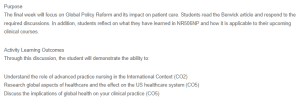Global Policy Reform and its Impact on Patient Care
Informed Decision-Making in Nursing Practice on a Global Basis
In the course of NR506NP, I have gained a deeper understanding of how to make informed decisions in nursing practice that can significantly impact patient outcomes on a global scale. (Arends et al., 2022) The article emphasizes the importance of addressing global healthcare quality to ensure that universal health coverage (UHC) is not just about access but also about the quality of care provided. This concept is crucial as it underlines the need for evidence-based decision-making tailored to the specific context of each patient, community, and healthcare system.
The most relevant aspect of the delivery of health care that the course explains is the application of systems thinking. From this perspective, I can expect difficulties in the system, comprehend the interrelatedness of several healthcare system components, and make optimal decisions based on culture and population preferences. This approach will be especially useful in my future practicum, as setting up these principles will help me deliver proper and fair care to the patient. For instance, in a clinical setting, I will prioritize care that is patient-centered, anticipatory, and reflective of the diverse needs of the population I serve, aligning with the principles outlined by McNab et al. (2020). Furthermore, I will use this understanding to collaborate with interdisciplinary teams, ensuring that every decision contributes to the broader goal of improving healthcare outcomes on a global scale.
Application to Future Clinical Practice
The content to be learned in NR506NP will help to inform future clinical practice. The emphasis placed on understanding international health, medical organizations, and health policies has given me the framework for looking at the patient holistically. Using the knowledge regarding the global aspect of health and care as described by Ambushe et al., (2023), I realize that global challenges in health and care can affect the quality chasm.
In my upcoming clinical courses, I will utilize the acquired knowledge of Universal Health Challenges to enhance patient outcomes regionally. This involves not only appreciating the significance of delivering the best quality care but also fighting for improved systems that operate in health facilities (Darrudi et al., 2022). For instance, I want to promote the integration of continuous feedback and learning to guarantee that the delivery of care is always evidence-based and patient-centered.
Furthermore, the course has made me appreciate leadership in the enhancement of quality in the healthcare sector. In clinical practice, I will embrace leadership responsibilities, including participation in policy-making and seeking to enhance transparency within clinical practice. It will entail involving the patients, healthcare staff, and the community to come up with solutions for the improvement of care (Nilsen et al., 2020).
Conclusion
The knowledge and skills acquired in NR506NP have allowed me to make the right decision that improves patient health locally and internationally. Systems thinking, global health, and leadership in health care will be particularly useful as I proceed to my clinical classes as well as my practice. To that end, I shall endeavor to adhere to these principles in order to foster my practice with up-to-par competence and, thereby, advance the AVA mission to enhance the global standard of care.
References
Ambushe, S. A., Awoke, N., Demissie, B. W., & Tekalign, T. (2023). Holistic Nursing Care Practice and Associated Factors among Nurses in Public Hospitals of Wolaita Zone, South Ethiopia. BMC Nursing, 22(1). https://bmcnurs.biomedcentral.com/articles/10.1186/s12912-023-01517-0
Arends, S. A. M., Thodé, M., De Veer, A. J. E., Pasman, H. R. W., Francke, A. L., & Jongerden, I. P. (2022). Nurses’ perspective on their involvement in decision‐making about life‐prolonging treatments: A quantitative survey study. Journal of Advanced Nursing, 78(9). https://doi.org/10.1111/jan.15223
Darrudi, A., Khoonsari, M. H. K., & Tajvar, M. (2022). Challenges to Achieving Universal Health Coverage Throughout the World: A Systematic Review. Journal of Preventive Medicine and Public Health, 55(2), 125–133. https://doi.org/10.3961/jpmph.21.542
McNab, D., McKay, J., Shorrock, S., Luty, S., & Bowie, P. (2020). Development and application of “systems thinking” principles for quality improvement. BMJ Open Quality, 9(1), e000714. https://doi.org/10.1136/bmjoq-2019-000714
Nilsen, P., Seing, I., Ericsson, C., Birken, S. A., & Schildmeijer, K. (2020). Characteristics of successful changes in health care organizations: an interview study with physicians, registered nurses and assistant nurses. BMC Health Services Research, 20(147), 1–8. https://doi.org/10.1186/s12913-020-4999-8
ORDER A PLAGIARISM-FREE PAPER HERE
We’ll write everything from scratch
Question
Purpose
The final week will focus on Global Policy Reform and its impact on patient care. Students read the Berwick article and respond to the required discussions. In addition, students reflect on what they have learned in NR506NP and how it is applicable to their upcoming clinical courses.

Global Policy Reform and its Impact on Patient Care
Activity Learning Outcomes
Through this discussion, the student will demonstrate the ability to:
Understand the role of advanced practice nursing in the International Context (CO2)
Research global aspects of healthcare and the effect on the US healthcare system (CO5)
Discuss the implications of global health on your clinical practice (CO5)

